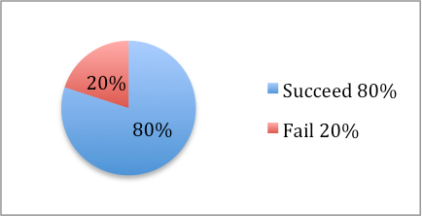1. The investor starts with 100 tokens and the entrepreneur starts with 0.
2. The entrepreneur proposes a contract to the investor to attract investment for a project. e.g. If the entrepreneur proposes a 50% return, he promises to evenly divide the payout if the investment succeeds.3. The investor chooses between accepting the contract, in which case she invests some or all of her tokens, and rejecting the contract and walking away with her initial 100 tokens. The entrepreneur will only know whether the contract is accepted or rejected, but not the amount of tokens invested.
4. If the investor chooses to invest, the entrepreneur may or may not need to complete a task that is necessary for the project to succeed.
5. There is an 80% chance that the project would succeed and a 20% chance that it would fail.
If the project succeeds, every token invested would turn into 5 tokens; if it fails, all tokens invested would be lost.
6. If the project succeeds, the entrepreneur chooses between following the contract (paying what he promised) and breaking the contract (keeping all the profits and bribing a judge).
7. There are 10 judges in the system; some of them are corrupt and would take bribes; the others are honest and don’t take bribes. You don’t know which one you’ll meet until before step 6.
8. The entrepreneur only has the option to bribe when the judge is corrupt. The entrepreneur can choose not to bribe even when facing a corrupt judge.
Please answer each question carefully. We will randomly match you up with another subject and use your choices to play out the game. You will receive a payment at an exchange rate of 250 tokens to 1 dollar based on the outcome of the game. Essentially you are giving directions to an agent who will play out this game for you, so consider your choices carefully.
Example 1: The entrepreneur offers a contract with 20% return to the investor. The investor rejects the contract and keeps all tokens. Here, the investor gets 100 tokens and the entrepreneur gets 0.
Example 2: The entrepreneur offers a contract with 60% return to the investor. The investor accepts the contract and gives all 100 tokens. The investment succeeds and yields 500 tokens. The entrepreneur discovers that the judge is honest so he has to follow the contract and gives 300 tokens back to the investor. So the investor gets 300 tokens and the entrepreneur gets 200 tokens.
Example 3 a: The entrepreneur offers a contract with 80% return to the investor. The investor accepts the contract and invests 60 tokens. The investment succeeds and yields 300 tokens. The entrepreneur finds out that the court is corrupt and he can bribe the judge with 100 tokens. This dishonest entrepreneur chooses to break the contract and bribe the judge. The investor gets 0 token from the investment plus the 40 tokens she kept (40 in total), and the entrepreneur gets all 300 tokens minus 100 tokens for bribes (200 in total).
Example 3 b: The entrepreneur offers a contract with 80% return to the investor. The investor accepts the contract and invests 60 tokens. The investment succeeds and yields 300 tokens. The entrepreneur finds out that the court is corrupt and he can bribe the judge with 100 tokens. This honest entrepreneur chooses to honor the contract. The investor gets 240 tokens from the investment plus the 40 tokens she kept (280 in total), and the entrepreneur gets 60 tokens.



